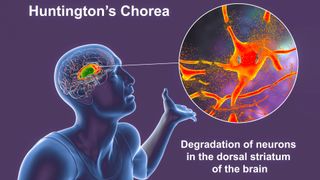The cause of a fatal neurodegenerative disease has been identified
Scientists have identified an enzyme that may play an important role in the onset of Huntington’s disease, a rare and fatal disease that causes brain cells to die.
New research in mice and humans has shown that levels of a specific enzyme – glutathione S-transferase omega 2 (GSTO2) – rise brain before Huntington’s symptoms start.
The findings, published on Oct. 28 in the newspaper Nature MetabolismIt could point to new ways to stop Huntington’s before it progresses, the study authors say. Future treatments may include drugs that block GSTO2, stopping or slowing the progression of the disease.
Huntington’s disease is an inherited disease caused by a mutation in a gene called HTT, which contains instructions for a protein called huntingtin. A parent who carries this mutation it has a 50% chance. to pass Huntington’s disease to every child.
Related: Lab-grown ‘minibrains’ help reveal why traumatic brain injury raises risk of dementia
The mutation prompts cells to make too much dopamine – an important chemical messenger in the brain – and this causes certain neurons to shrink. This decay is mainly seen in the part of the brain called the striatumto cause patients to appear cognitive and movement-related symptoms. These may include difficulty walking, involuntary movements, and difficulty concentrating.
Huntington’s symptoms are often the first to appear in a person 30 to 50s. The condition gradually weakens the patient’s ability to work, eventually leading to death about 10 to 30 years after symptoms begin.
Until now, scientists have not been able to explain why the mutation of HTT produces an excessive production of dopamine. This is another reason there is no cure for Huntington’s – only available medications help relieve symptoms once the damage has been done. The type of HTT also works throughout the body, making it difficult to develop targeted therapies that counteract its effects on the brain.
In the new study, the researchers took a different approach: “Instead of looking at the specific gene mutation that causes Huntington’s disease, we looked for signs that this mutation affects what they do.” ,” Liliana Minichiellolead author of the study and professor of cellular and molecular neuroscience at the University of Oxford, told Live Science.

Brain cells transfer chemicals for the sake of communication. Furthermore, within each brain cell, changes in the chain of chemical reactions help neurons to survive, grow and maintain their integrity. For example, there are signs which is necessary to keep the nerves aliveand these signs are known to dysfunction of Huntington’s disease. Specific neurons in the striatum are vulnerable the signal is reduced in this way.
To investigate this idea further, the researchers produced genetically modified mice whose cells in the striatum were unable to produce these important survival signals. They observed that dopamine levels in the brains of mice increased months before the mice developed movement symptoms similar to early Huntington’s.
By measuring the gene activity of striatum neurons, the researchers found that disrupting cell survival signals appeared to increase the amount of GSTO2 in the cells. Ultimately, this increase in GSTO2 is what drives dopamine production and leads to progressive motor dysfunction in mice.
Inhibiting GSTO2 prevented all of these processes from occurring, the team found.
In separate experiments, the researchers observed a similar increase in GSTO2 in the brains of rats with the same condition as Huntington’s, as well as brain cells from Huntington’s patients. Mice and humans have shown this ability in GSTO2 but have not yet developed their symptoms.
Taken together, these findings reveal a variety of cellular changes that may cause the onset of Huntington’s disease.
The researchers now need to look at the role of GSTO2 in mice carrying the HTT mutation, to double-check that the link is causative. If so, GSTO2 may be a new target for drugs designed to stop or slow the progression of Huntington’s, Minichiello suggested.
Always ask yourself why some people build muscle more easily than others or why spots appear in the sun? Send us your questions about how the human body works community@livescience.com with the subject “Health Desk Q,” and you can see your question answered on the website!
#fatal #neurodegenerative #disease #identified